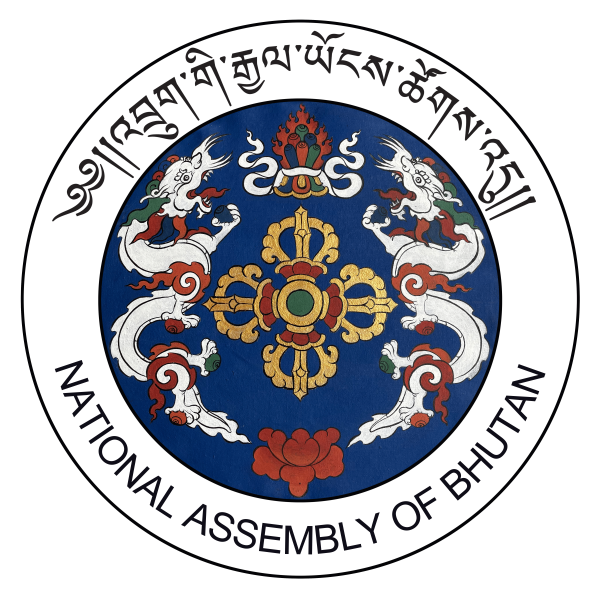
Action Taken Reports on the Resolutions of the First Session
On 18 November 2024, the Minister for Agriculture and Livestock (MoAL), the Minister for Health and the Minister for Finance presented the Action Taken Reports (ATR) on the resolutions of the First Session on the establishment of Crop and Livestock Compensation Trust Fund, Improvement of Health Care Services and Need of a Priority Development Fund, respectively.
Crop and Livestock Compensation Trust Fund
The Minister for Agriculture and Livestock reported on the motion adopted by the First Session on the proposal to establish a Crop and Livestock Compensation Trust Fund.
The Minister highlighted past efforts since 2016 to develop a compensation mechanism, including unsuccessful attempts to establish an endowment fund (2017) and an insurance plan (2021). Based on these experiences, the Ministry proposed a national crop and livestock insurance scheme, with the government subsidizing 50% of premiums. The premium contribution could vary from 20% to 80%, depending on affordability.
The Ministry consulted the Ministry of Finance and formed a Technical Working Group to refine the scheme, which is planned for implementation next year, subject to budget approval.
During deliberations, Members raised concerns about the affordability of premiums for farmers and proposed a trust fund as an alternative. Some suggested expanding coverage to include additional commodities and highland livestock. The Minister assured that the proposed scheme would balance government support and farmer contributions.
The House acknowledged the report and supported the proposed insurance scheme over a trust fund, considering the Minister's seven-point rationale. The resolution was passed by a show of hands, with 29 Members in favor out of 40 Members attending the sitting. The Minister was instructed to submit a follow-up report during the Summer Session.
Improvement of Health Services
The Minister for Health informed the National Assembly on the actions taken by the ministry towards improving healthcare services in the country, in line with resolutions passed by the Assembly. Key actions taken included restructuring the Ministry to improve governance and service delivery, such as integrating the National Medical Services (NMS) and creating new roles like Dzongkhag Health Officers (DHOs). The House was informed that the Department of Traditional Medicine Services is also being reinstated to promote a more integrated healthcare system, with the Royal Civil Service Commission (RCSC) set to review the reorganization.
The Ministry has reached a 95% availability target for essential medicines, streamlined supply chains, and is planning to build regional medical depots in Samdrup Jongkhar and Paro during the 13th Five-Year Plan. Outreach Clinics (ORCs) have resumed, and funding for emergency medical services remains sufficient. Proposals for additional CT and MRI machines at JDWNRH are being pursued with the WHO and the Government of Japan, while also considering to avail refurbished equipment despite customs challenges. To address overcrowding in the Emergency Department, 36 new beds and additional nurses have been added, and a new hospice facility is under development with support from Her Majesty the Royal Grandmother.
During deliberations, members while applauding the Ministry's efforts raised concerns about overtime payment, Travel Allowances and outreach clinic service improvements, and better recreational facilities for health workers. They also called for stronger food safety measures and clearer mandates to reduce staff resignations. The Minister also assured that health workers would be recognized on World Health Day as an incentive and efforts to improve recreational facilities, including a canteen and gym at JDWNRH, are underway.
The House acknowledged the report and supported the Ministry's ongoing efforts.
Follow up Report on Priority Development Fund respectively.
The Minister for Ministry of Finance (MoF) submitted its review on the proposal to reintroduce the Constituency Development Grant (CDG), now proposed as the Priority Development Fund (PDF), following a motion passed by the National Assembly in July 2024. The Minister submitted several concerns, including constitutional issues related to MPs’ involvement in both approving and overseeing development funds, capacity gaps in local governments, and risks of unequal fund distribution. The review also highlighted past non-compliance with CDG guidelines and the potential for electoral interference, which could undermine public trust in the process. The MoF recommended using existing funding systems, such as the Resource Allocation Formula (RAF) and annual block grants, rather than creating a separate PDF.
During the deliberation, Members pointed out that the report was not in line with the resolutions of the First Session which had called for the Ministry to allocate, review and formulate guidelines for the allocation, utilization, monitoring and evaluation of activities, and reporting of the implementation progress of activities and to define the areas where the Priority Development Fund should be put to use to maximize the benefit and table it to the preliminary meeting.
The House, noting that the resolutions of the motion were not implemented by the Ministry of Finance, decided to continue following up on it in the following sessions in accordance with Section 103 of the Rules of Procedure of the National Assembly of Bhutan, 2022. If there are any legal questions, the House may also seek opinions of the Attorney General as provided for by the Constitution of the Kingdom of Bhutan.
Comment
You May Also Like
Vote / Poll
How should the government react to Bhutanese leaving to Australa ?





